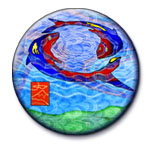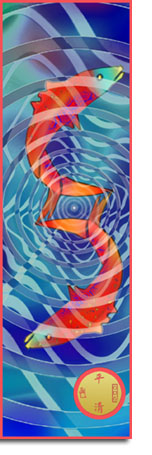On The Way: The Daily Zen Journal
Wake-up Sermon Part 2
Bodhidharma (d 528)
Seen with true vision, form isn’t simply form because form depends on mind. And mind isn’t simply mind, because mind depends on form. Mind and form create and negate each other. That which exists exists in relation to that which doesn’t exist. And that which doesn’t exist doesn’t exist in relation to that which exists.
This is true vision. By means of such vision, nothing is seen and nothing not seen. Such vision reaches throughout the ten directions without seeing. Because nothing is seen. Because not seeing is seen. Because seeing isn’t seeing. What mortals see are delusions. True vision is detached from seeing.
The mind and the world are opposites, and vision arises where they meet. When your mind doesn’t stir inside, the world doesn’t arise outside. When the world and the mind are both transparent, this is true vision. And such understanding is true understanding.
To see nothing is to find the Way. To understand nothing is to know the Dharma. Because seeing is neither seeing nor not seeing. And because understanding is neither understanding nor not understanding. Seeing without seeing is true vision. Understanding without understanding is true understanding.
True vision isn’t just seeing seeing. It’s also seeing not seeing. And true understanding isn’t just understanding understanding. It’s also understanding not understanding. If you understand anything, you don’t understand. Only when you understand nothing is it true understanding. Understanding is neither understanding nor not understanding.
The sutras say, “Not to let go of wisdom is stupidity.” When the mind doesn’t exist, understanding and not understanding are both true. When the mind exists, understanding and not understanding are both false.
When you understand, reality depends on you. When you don’t understand, you depend on reality. When reality depends on you, that which isn’t real becomes real. When you depend on reality, that which is real becomes false. When you depend on reality, everything is false. When reality depends on you, everything is true.
Thus the sage doesn’t use his mind to look for reality, or reality to look for his mind, or reality to look for reality. His mind doesn’t give rise to reality. And reality doesn’t give rise to his mind. And because both his mind and reality are still, he’s always in samadhi.
When the mortal mind appears, buddhahood disappears. When the mortal mind disappears, buddhahood appears. When the mind appears, reality disappears. When the mind disappears, reality appears. Whoever knows that nothing depends on anything has found the Way. And whoever knows that the mind depends on nothing is always at the place of enlightenment.

When you don’t understand, you’re wrong. When you understand, you’re not wrong. Because the nature of wrong is empty. When you don’t understand, right seems wrong. When you understand, wrong isn’t wrong. Because wrong doesn’t exist.
The sutras say, “Nothing has a nature of its own.”
Act. Don’t question. When you question, you’re wrong. Wrong is the result of questioning. When you reach such an understanding, the wrong deeds of your past lives are wiped away. When you’re deluded, the six senses and five shades are constructs of suffering and mortality. When you wake up, the six senses and five shades are constructs of nirvana and immortality.
Someone who seeks the Way doesn’t look beyond himself. He knows that the mind is the Way. But when he finds the mind, he finds nothing. And when he finds the Way, he finds nothing. If you think you can use the mind to find the Way, you’re deluded. When you’re deluded, buddhahood exists. When you’re aware, it doesn’t exist. Because awareness is buddhahood.
If you’re looking for the Way, the Way won’t appear until your body disappears. It’s like stripping bark from a tree. This karmic body undergoes constant change. It has no fixed reality. Practice according to your thoughts. Don’t hate life and death or love life and death. Keep your every thought free of delusion, and in life you’ll witness the beginning of nirvana, and in death you’ll experience the assurance of no rebirth.
To see form but not be corrupted by form or to hear sound but not be corrupted by sound is liberation. Eyes that aren’t attached to form are the Gates of Zen. Ears that aren’t attached to sound are also the Gates of Zen. In short, those who perceive the existence and nature of phenomena and remain unattached are liberated.
Those who perceive the external appearance of phenomena are at their mercy. Not to be subject to affliction is what’s meant by liberation. There’s no other liberation. When you know how to look at form, form doesn’t give rise to mind, and mind doesn’t give rise to form. Form and mind are both pure.
When delusions are absent, the mind is the land of buddhas. When delusions are present, the mind is hell. Mortals create delusions. And by using the mind to give birth to mind, they always find themselves in hell. Bodhisattvas see through delusions. And by not using the mind to give birth to mind, they always find themselves in the land of buddhas.
If you don’t use your mind to create mind, every state of mind is empty, every thought is still. You go from one buddha land to another. If you use your mind to create mind, every state of mind is disturbed, every thought is in motion. You go from one hell to the next. When a thought arises, there’s good karma and bad karma, heaven and hell. When no thought arises, there’s no good karma or bad karma, no heaven or hell.
The body neither exists nor doesn’t exist. Hence, existence as a mortal or non-existence as a sage are conceptions with which a sage has nothing to do. His heart is empty and spacious as the sky.
Bodhidharma (d 528)
Excerpted from The Zen Teaching of Bodhidharma translated by Red Pine 1987




Not all Zen teaching is immediately easy to grasp. This is classic Zen delivered to us by the very famous patriarch of Zen, Bodhidharma. However, it is like riding through rapids down the River of No Return and holding on for dear life at times! The very nature of the paradoxes stops us on our ride through this teaching. The mind literally is unable to grasp much of this at times. And that’s just perfect; it is always a bit suspicious when we grasp anything too quickly or easily. We so easily fool ourselves into a complacency of “getting it.” What an illusion we create at times…
There are many lights that shine through this teaching. Very smoothly he connects the relationship of affliction and liberation; he really seems to be trying to help us break through.
Suffering is the seed, wisdom the sprout and Buddhahood the grain.
I realize some of this reads like Lewis Carroll’s Through the Looking Glass, in particular the poem Jabberwocky. If you’ve never read that, pause a moment to read it online, then return to read this piece!
Dropping our understandings and maintaining an open mind are some of the most useful tools along the Way…..with the foundation being Trust in the Way.
Riding the waves together,
Elana